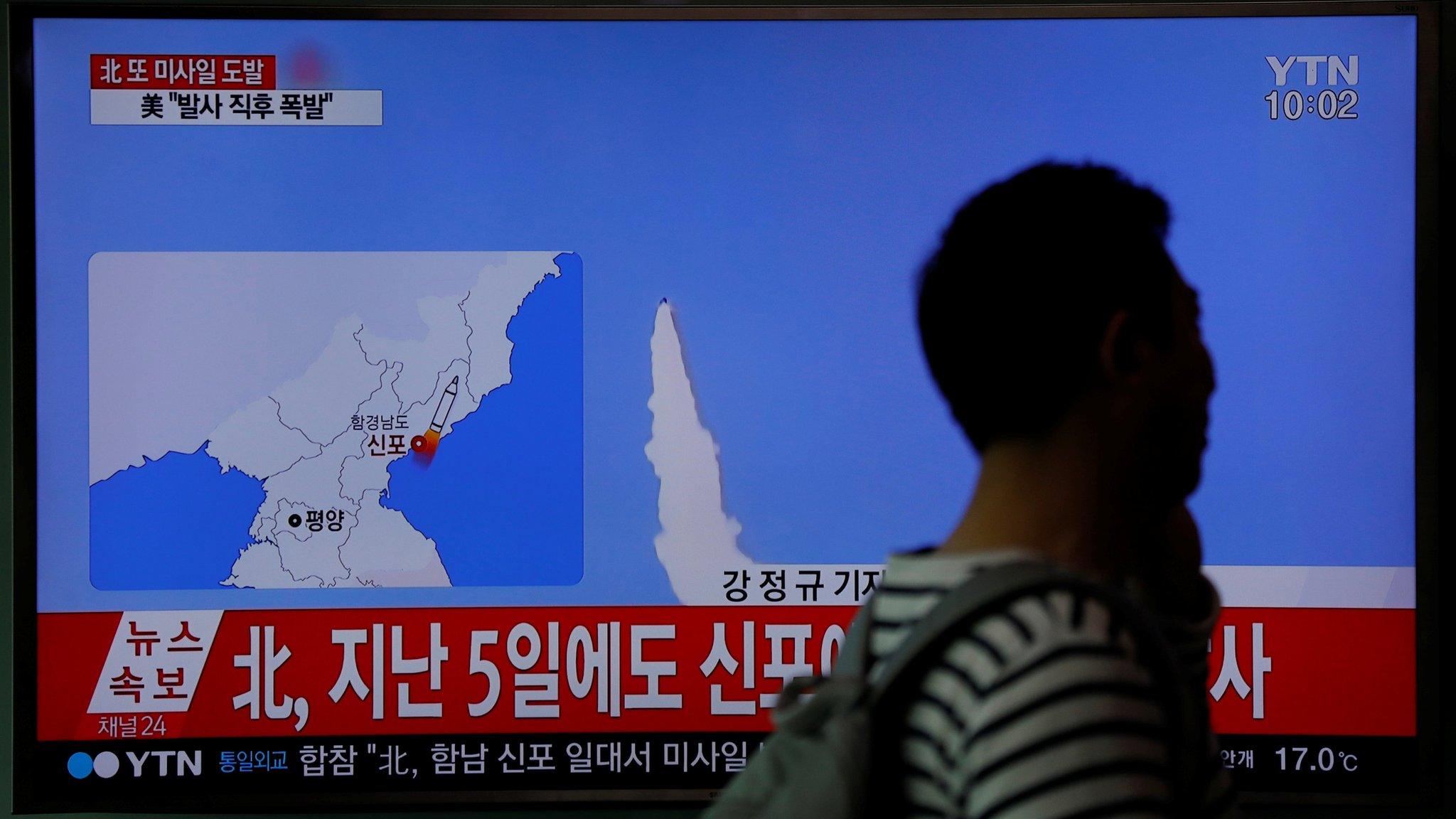North Korea missile launch a 'provocation', US defence chief says
- Published
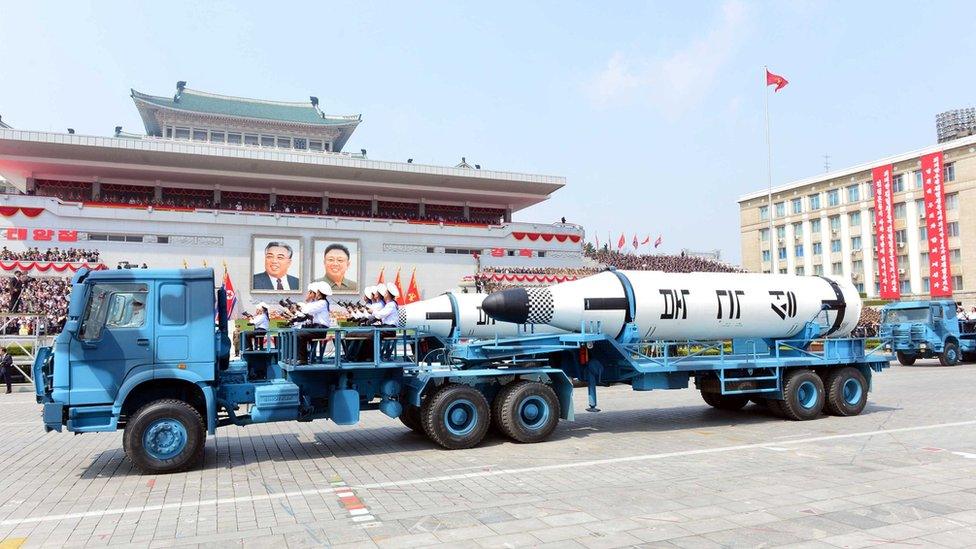
North Korea paraded military hardware ahead of its failed launch
The US has accused North Korea of trying to "provoke something", after Pyongyang conducted a failed missile test over the weekend.
US Defence Secretary James Mattis said the test was a reckless move and the US was "working closely" with China to engage North Korea.
The missile fired on Sunday blew up almost immediately, the Pentagon said.
Pyongyang said it may test missiles on a weekly basis, and warned of "all-out war" if the US takes military action.
"If the US is planning a military attack against us, we will react with a nuclear pre-emptive strike by our own style and method," Vice-Foreign Minister Han Song-ryol told the BBC on Monday.
Both sides have ratcheted up the rhetoric following North Korea's latest missile test.
Mr Mattis said Sunday's missile test had not involved an intercontinental ballistic missile but had still been reckless.
"It shows why we are working so closely right now with the Chinese... to try to get this under control and aim for the denuclearised Korean peninsula," he said.
What is the US doing?
On Tuesday, a report in the Guardian newspaper, external quoted unnamed officials as saying the US was considering shooting down North Korean missile tests as a show of strength.
The US is also threatening tougher economic sanctions that could include an oil embargo, a global ban on North Korea's airline, intercepting cargo ships and punishing Chinese banks that do business with the country, Reuters news agency says.
US Vice-President Mike Pence: "North Korea would do well not to test [President Trump's] resolve"
However, it has emerged that a US aircraft carrier, which the US said had been deployed towards the Korean peninsula earlier this month, had actually been sailing in the opposite direction.
On 8 April, the navy said it had ordered the USS Carl Vinson to "sail north" as a deterrent against North Korea.
A few days later, Mr Mattis said the aircraft carrier was "on her way up there".
US President Donald Trump also told Fox News on 12 April: "We are sending an armada, very powerful."
However, a navy photo released on 15 April revealed that the aircraft carrier had actually sailed further south, to the Sunda Strait near Indonesia, to take part in planned drills with Australian forces in the Indian Ocean.
The USS Carl Vinson is now set to head north towards the Korean peninsula, a defence official told AFP news agency.
What is North Korea doing?
North Korea has accelerated its nuclear and missile tests in recent years, despite international condemnation and UN sanctions.
Its aim is to be able to put a nuclear warhead on an intercontinental ballistic missile that can reach targets around the world, including the US.
North Korea claims it has successfully made nuclear warheads small enough to fit onto a missile - but this has never been independently verified, and some experts have cast doubts on the claims.
The BBC's John Sudworth asks North Korea's vice-foreign minister what message he has for Donald Trump.
Vice-Foreign Minister Han Song-ryol told the BBC that North Korea believed its nuclear weapons "protect" it from the threat of US military action.
The North fears the US and South Korea could use force in an attempt to overthrow the regime of Kim Jong-un.
At the UN on Monday, North Korea's permanent representative Ambassador Kim In-ryong condemned the US missile strikes in Syria, which targeted an air base after a suspected chemical attack by the government.
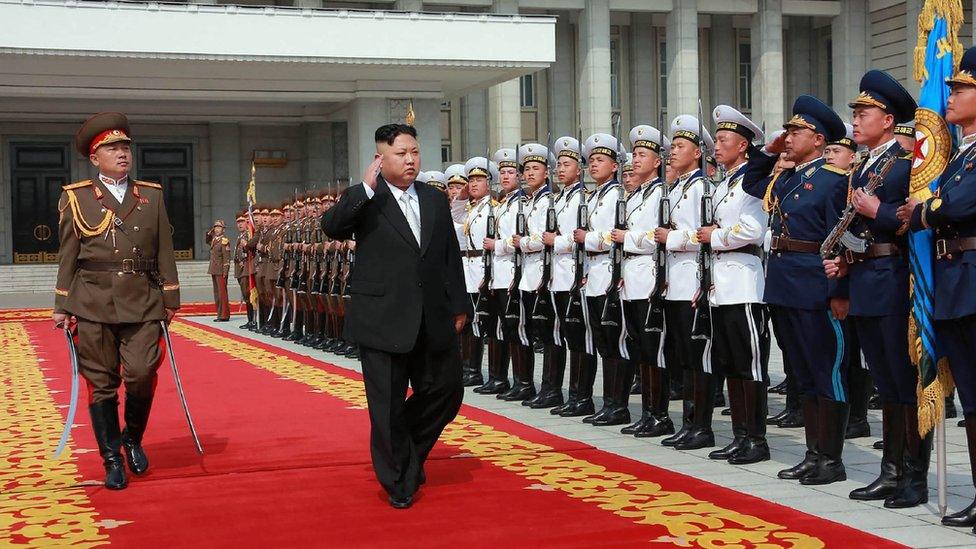
North Korea's Kim Jong-un has not left the country since becoming leader
He said the US was "disturbing global peace and stability and insisting on the gangster-like logic that its invasion of a sovereign state is decisive and just and proportionate and contributes to defending the international order".
Observers say North Korea may carry out a sixth nuclear test soon.
And what do other world powers say?
China has criticised North Korea's missile tests. In February it banned imports of North Korean coal and reports in Chinese media have raised the possibility of restricting shipments of oil to the isolated North if the tests continue.
Chinese Foreign Ministry spokesman Lu Kang told reporters in Beijing on Monday that the Korean peninsula was "highly sensitive, complicated and high risk" and that all sides should "avoid taking provocative actions that pour oil on the fire".
Russia's Foreign Minister Sergei Lavrov said Moscow would not tolerate "missile adventures by Pyongyang" but a unilateral use of power by the US would be "a very risky course".
Japanese Prime Minister Shinzo Abe on Monday told a parliamentary session that diplomatic efforts were "important to maintain peace", but "dialogue for the sake of having dialogue is meaningless".
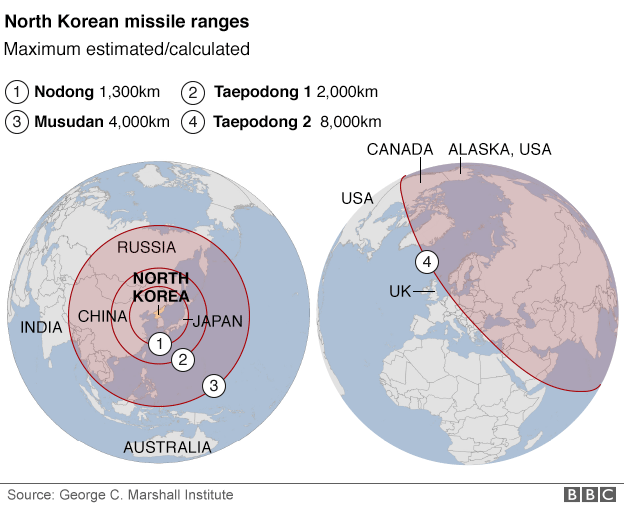
- Published18 April 2017
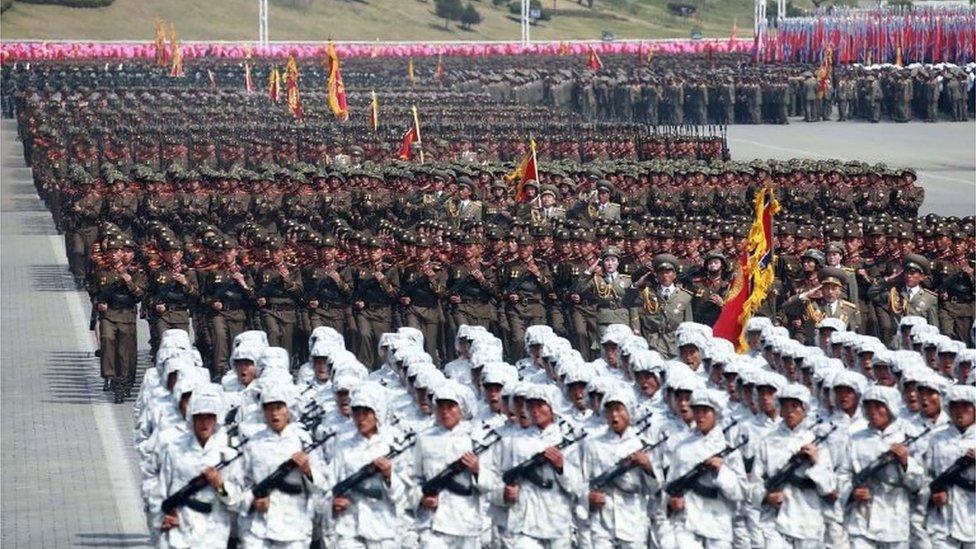
- Published4 July 2017
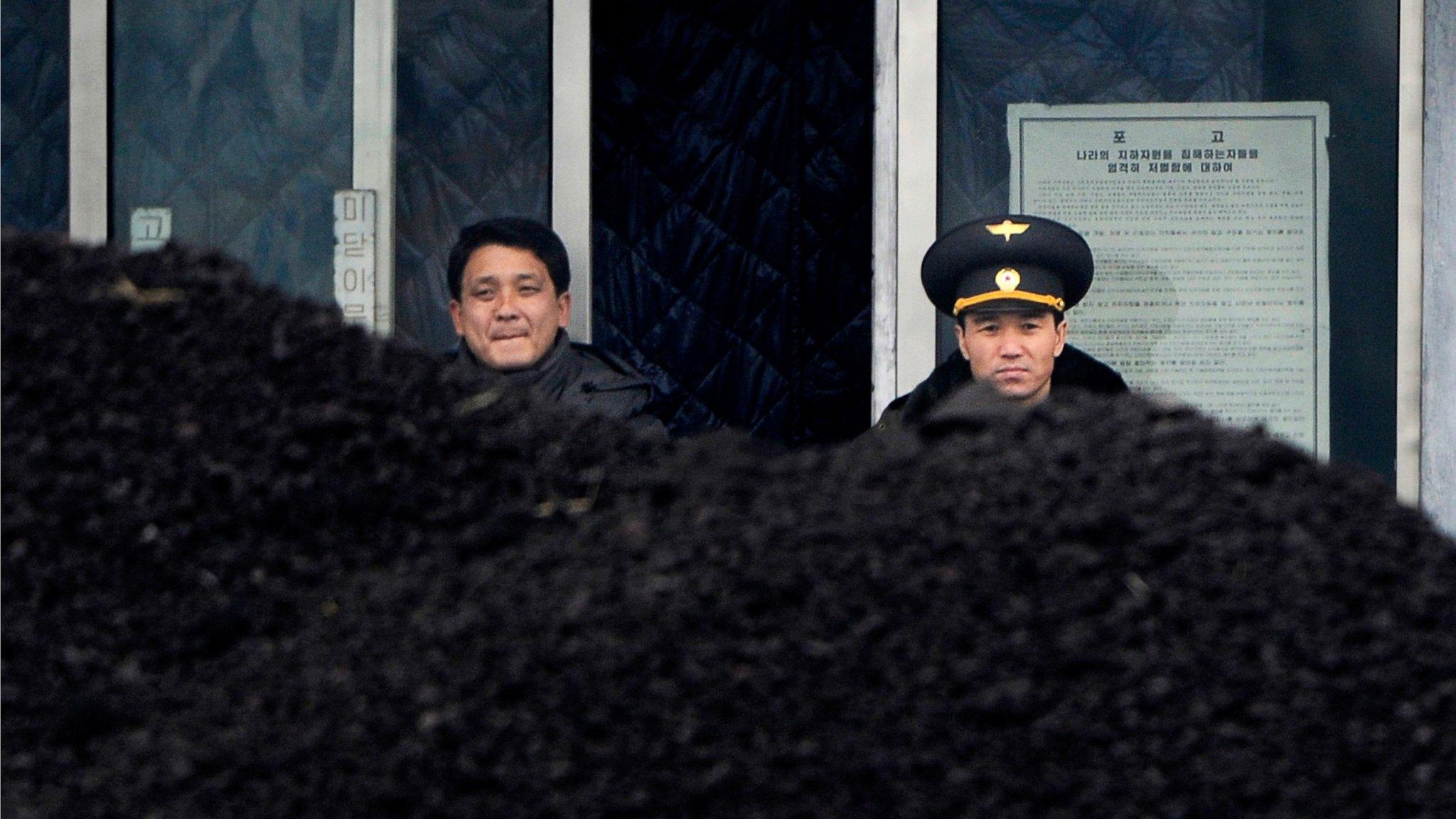
- Published15 April 2017
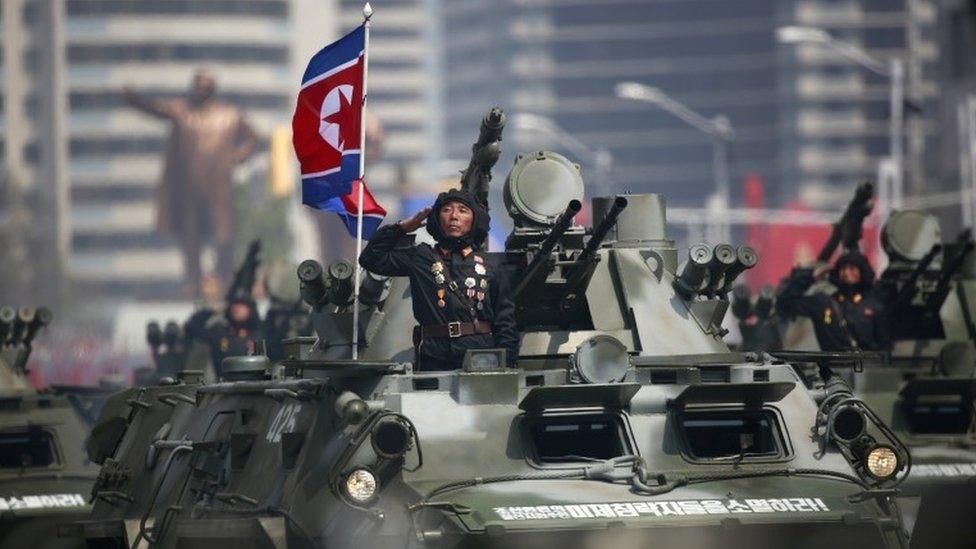
- Published10 August 2017
- Published10 August 2017
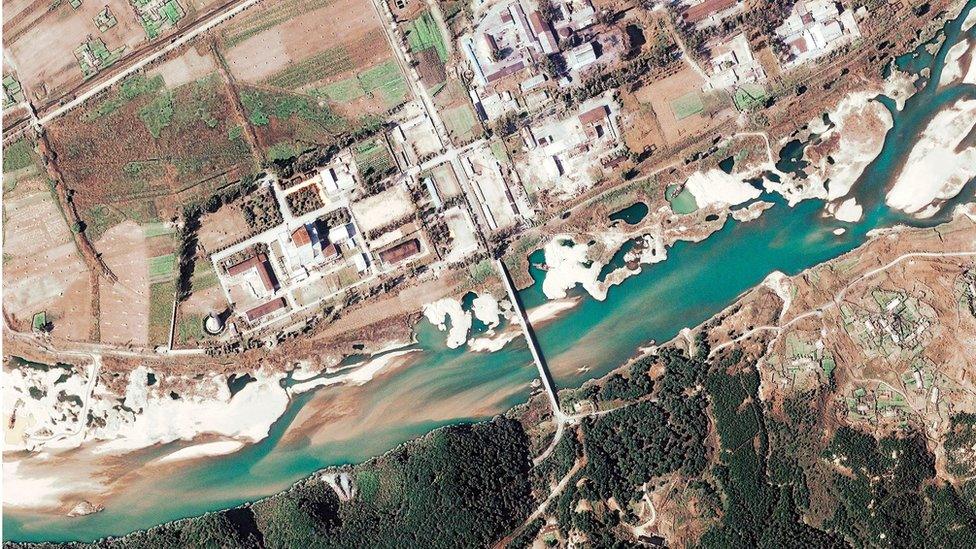
- Published16 April 2017
